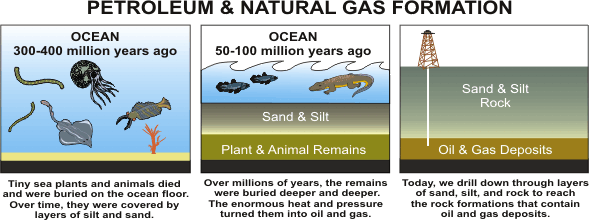
Millions of years ago, the remains of plants and animals decayed and built up in thick layers. This decayed matter from plants and animals is called organic material -- it was once alive. Over time, the mud and soil changed to rock, covered the organic material and trapped it beneath the rock. Pressure and heat changed some of this organic material into coal, some into oil (petroleum), and some into natural gas -- tiny bubbles of odorless gas. The main ingredient in natural gas is methane, a gas (or compound) composed of one carbon atom and four hydrogen atoms.

In some places, gas escapes from small gaps in the rocks into the air; then, if there is enough activation energy from lightning or a fire, it burns. When people first saw the flames, they experimented with them and learned they could use them for heat and light.
Because natural gas is colorless, odorless and tasteless, mercaptan (a chemical that has a sulfur like odor) is added before distribution, to give it a distinct unpleasant odor (smells like rotten eggs). This serves as a safety device by allowing it to be detected in the atmosphere, in cases where leaks occur.
The gas companies collect it in huge storage tanks, or underground, in old gas wells. The gas remains there until it is added back into the pipeline when people begin to use more gas, such as in the winter to heat homes.

ADVANTAGES
Gas can be stored as a liquid, by chilling it down to very cold temperatures. This makes it easier to transport, as it only takes up 1/600th of the space it would when it is a gas. After delivery, it can be turned back into gas again by raising the temperature.
It is very useful for heating, and also for cooking. Many of us use gas bottles in our barbeques, and industry uses it to make steel, glass, paper, clothing, brick, and electricity.
Natural gas burns more cleanly than other fossil fuels. It has fewer emissions of sulfur, carbon, and nitrogen than coal or oil, and it has almost no ash particles left after burning. Also gas-fired power stations are very efficient, meaning they produce a lot of power for the amount of gas they use.
DISADVANTAGES
As with other fossil fuels, burning natural gas produces carbon dioxide, which is the most important greenhouse gas. Many scientists believe that increasing levels of carbon dioxide and other greenhouse gases in the earth's atmosphere are changeing the global climate.
When natural gas leaks it can cause explosions. Since raw natural gas has no smell, natural gas companies add a smelly substance to it so that people will know if there is a leak. A gas explosion can be very dangerous and destructive.
Like all other fossil fuels, once we have burned it all, it will take millions of years for more natural gas to be formed. And we can't wait that long!